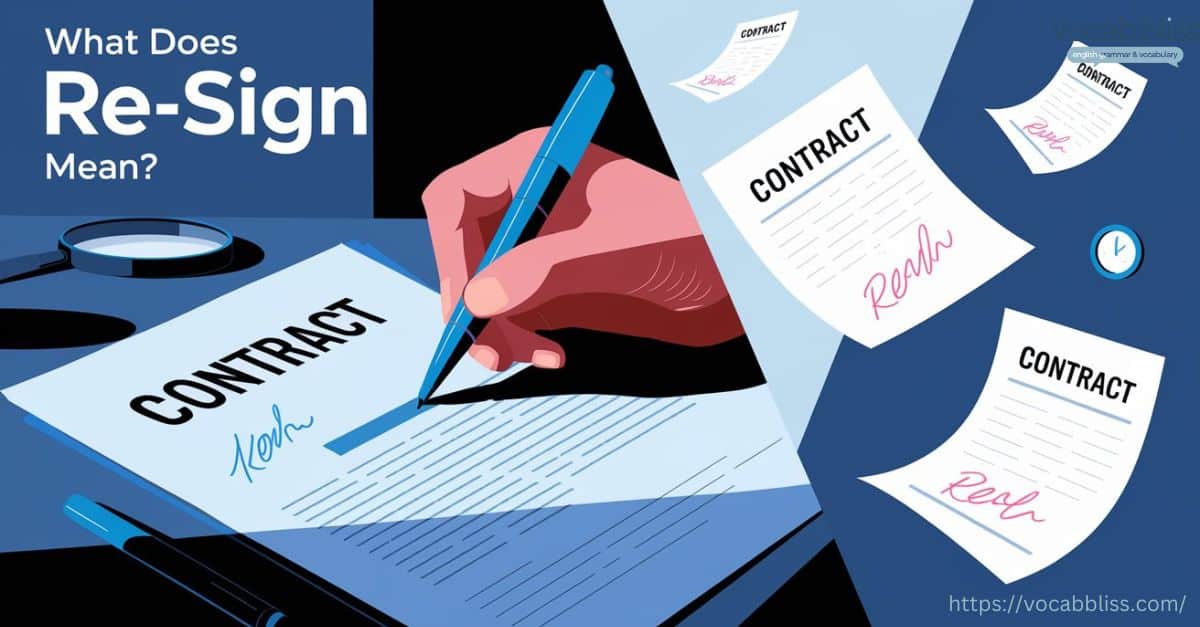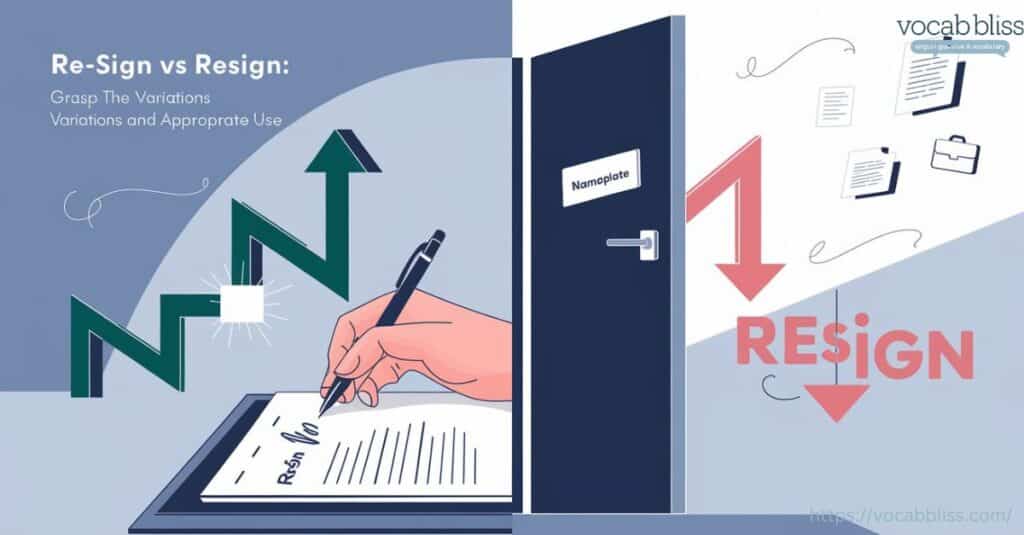Language can be tricky, especially when two words look similar but have completely different meanings. Take re-sign vs resign a tiny hyphen makes all the difference. If you’re unsure when to use each, you’re not alone. This guide will demystify the confusion and help you understand the correct usage of these terms.
Why Is There Confusion Between Re-sign vs Resign?
Understanding why people mix up re-sign vs resign starts with their similarities. These two words are nearly identical in spelling, and their pronunciations overlap in some contexts. However, their meanings are worlds apart, making the confusion both common and consequential.
The Role of Spelling, Pronunciation, and Context
- Spelling Similarity:
Both words contain the same letters, but the presence or absence of a hyphen changes the meaning completely. Without careful attention, it’s easy to overlook the hyphen in re-sign, especially in handwritten or informal text.- Re-sign: Adding the hyphen signals “to sign again.”
- Resign: Without a hyphen, it means “to step down” or “quit.”
- Pronunciation Overlap:
Pronunciation adds another layer of complexity. While the stress differs slightly:- Re-sign: Emphasizes the first syllable, pronounced as “REE-sign.”
- Resign: Emphasizes the second syllable, pronounced as “ree-ZINE.”
- Context-Dependent Clarity:
The meaning of these words depends heavily on context. For example:- “I will re-sign the document tomorrow.”
- “I will resign from my position tomorrow.”
Common Mistakes and Misunderstandings in Everyday Usage
- Skipping the Hyphen:
Writers often drop the hyphen in re-sign, either due to oversight or because they aren’t aware of its importance. This can lead to unintended and confusing messages.- Mistake: “He will resign his contract next week.”
- Intended Meaning: “He will re-sign his contract next week.”
- Misinterpreting Intent:
Even when spoken, listeners may misinterpret the intent due to similar pronunciation. For instance:- “The coach decided to resign.”
- Did the coach quit, or renew their agreement?
Misinterpretations like this are common in sports and business news.
- Did the coach quit, or renew their agreement?
- “The coach decided to resign.”
- Casual Communication:
Informal settings, like text messages or emails, often lack punctuation and proper phrasing. This increases the likelihood of re-sign and resign being mixed up. - Lack of Awareness:
Many people are simply unaware of the critical role the hyphen plays in distinguishing between the two terms.
Discover more: Allude vs Elude: How and where to Use
What Does Re-sign Mean?

The term re-sign means “to sign again.” It’s a verb often used in contexts where an individual or organization renews or extends an agreement, contract, or commitment. Adding the hyphen transforms the word “resign,” which means to step down, into something entirely different—renewing a bond or promise.
resign definition and Common Contexts
At its core, re-sign involves the act of repeating a signature, typically on a legal or formal document. It signifies agreement, reaffirmation, or extension. This term is especially common in the worlds of business, sports, and legal negotiations.
Here’s where re-sign is most often seen:
- Employment Contracts: An employee may choose to re-sign with their current company after a successful negotiation of terms.
- Sports Agreements: Athletes often re-sign contracts with teams to continue their careers under favorable conditions.
- Leases and Rental Agreements: Tenants may re-sign a lease to extend their stay in a rental property.
- Partnerships and Collaborations: Companies may re-sign partnership agreements to maintain mutual benefits.
Usage in Professional Settings
- Contracts and Legal Agreements:
In professional environments, re-signing is a formal process requiring clear documentation. For example:- A software engineer chooses to re-sign their employment agreement for another three years after receiving a promotion.
- A landlord and tenant agree to re-sign a lease with updated terms, such as a higher rent or extended duration.
- Sports and Entertainment:
Re-sign is a term frequently heard in sports reporting and negotiations. Athletes and entertainers who renew contracts with teams or organizations are described as re-signing.- Example: “The star quarterback opted to re-sign with the team, ensuring another successful season ahead.”
- Example: “After months of deliberation, the actor decided to re-sign with the studio for a sequel.”
- Government and Public Sector:
In government or nonprofit work, officials and staff may re-sign agreements to continue serving in their roles.- Example: “The council member has agreed to re-sign her position for an additional term.”
Why Is Re-sign Important?
The process of re-signing signifies continuity and trust between parties. It often involves negotiations to improve terms, reflecting evolving relationships or mutual growth.
Synonyms for Re-sign
- Renew
- Extend
- Recommit
- Reapprove
What Does Resign Mean?
The term resign means “to voluntarily leave a position or role,” often associated with stepping down from a job, office, or responsibility. Unlike re-sign, which implies renewing a commitment, resign signals a deliberate decision to quit or withdraw.
Definition and Typical Contexts for Resign
At its core, resign involves choosing to end a professional or formal role, typically due to personal reasons, dissatisfaction, or external circumstances. It is a key term in employment, politics, and organizational settings.
Here’s how resign is commonly used:
- Employment: When employees decide to quit their jobs, they submit a resignation letter, officially notifying their employer of their decision.
- Politics: Public officials may resign due to controversies, personal reasons, or shifts in political priorities.
- Organizations and Clubs: Members may resign from groups or committees if they can no longer fulfill their duties.
Scenarios Where Resign Often Applies
- Quitting a Job:
Resignation in a professional context typically involves a formal process, such as submitting a letter or email.- Example: “After ten years with the company, she decided to resign to pursue new opportunities.”
- Political Departures:
In politics, resignations are often high-profile events, triggered by scandals, health issues, or policy disagreements.- Example: “The mayor announced he would resign amid allegations of corruption.”
- Stepping Down from Leadership:
Leaders in organizations may resign due to burnout, career changes, or a desire to pass the reins to someone else.- Example: “The CEO plans to resign after guiding the company through a successful merger.”
- Personal or Ethical Conflicts:
People may resign when their values or circumstances no longer align with their roles.- Example: “She chose to resign from the board of directors after a disagreement over the company’s direction.”
Synonyms for Resign

- Step down
- Quit
- Leave
- Withdraw
- Relinquish
The Weight of Resigning
Resigning is often a significant decision, as it can impact one’s career, reputation, and future opportunities. Therefore, it’s important to approach resignation thoughtfully, ensuring proper communication and a professional exit. Additionally, taking the time to plan your departure can help maintain positive relationships and leave a lasting, favorable impression.
Why Hyphenate Re-sign?
The hyphen in re-sign plays a crucial role in clarifying its meaning. Without it, the word could easily be mistaken for resign, which carries an entirely different implication. Proper hyphenation not only prevents confusion but also ensures your message is accurate and professional.
The Purpose of Hyphenation in Clarifying Meaning
- Avoiding Misinterpretation:
The hyphen clearly signals that the word means “to sign again,” rather than “to step down.” In written communication, even a small omission like this can create significant misunderstandings.- Re-sign: Indicates renewing or extending an agreement.
- Resign: Means to quit or withdraw from a role.
- Maintaining Consistency:
Hyphenating re-sign aligns with grammar conventions for compound verbs where the prefix “re-” changes the meaning significantly. This is particularly important in professional or legal writing, where precision is paramount. - Providing Visual Cues:
The hyphen acts as a visual separator, making it easier for readers to grasp the intended meaning at a glance.
Examples Showing the Importance of the Hyphen
Consider these examples where the hyphen drastically changes the meaning:
| Sentence | Intended Meaning | Correct Form |
|---|---|---|
| The employee decided to resign. | The employee chose to quit. | Resign |
| The employee decided to re-sign. | The employee chose to sign again. | Re-sign |
| The coach will resign the team. | The coach will leave the team. | Resign |
| The coach will re-sign the team. | The coach will extend their contract. | Re-sign |
Real-Life Implications
- In Business: A CEO emailing “I’ve decided to resign” when they meant re-sign could cause widespread confusion or even panic.
- In Sports: Headlines like “Star Player Resigns With Team” might mislead fans, making them think the athlete has quit instead of recommitting.
Re sign vs Resign: Key Differences Explained

Understanding the distinction between resign vs re-sign is critical for clear and effective communication. These words differ significantly in meaning, intent, pronunciation, and usage, despite their similar spellings. Let’s break down their key differences.
Meaning and Intent
The fundamental difference lies in the goals or outcomes implied by each term:
- Re-sign: This means to sign again or renew a previous agreement. It reflects a continuation or extension of a commitment, often with a positive connotation.
- Example: “The athlete will re-sign with the team for another season.”
- Outcome: Strengthening or reaffirming an existing relationship.
- Resign: This means to step down or voluntarily leave a position or role. It typically implies an end to a commitment and may carry a neutral or negative tone depending on context.
- Example: “The employee decided to resign due to personal reasons.”
- Outcome: Severing ties with a role, position, or agreement.
- Context transforms intent:
Consider the sentence, “He will resign his position tomorrow.” Without the hyphen, this clearly means he is quitting. However, with the hyphen—“He will re-sign his position tomorrow”—it suggests he will recommit to his role.
Pronunciation Differences
The distinction between re-sign and resign in spoken English lies in stress and emphasis:
- Re-sign: The stress falls on the prefix “re,” pronounced as “ree.” The hyphen breaks the word into two parts: ree-sign.
- Phonetic pronunciation: /ˌriːˈsaɪn/
- Resign: The stress falls on the second syllable, making it sound like ri-ZINE. The word is spoken as one continuous unit.
- Phonetic pronunciation: /rɪˈzaɪn/
Phonetic Cues to Distinguish:
- “Re-sign” emphasizes renewal; think “ree-new.”
- “Resign” sounds like “resignation,” reflecting an exit.
Listening for these subtle differences can help clarify intent in verbal communication.
Spelling Clues
Correct spelling ensures accurate meaning, especially in formal or professional writing. Here’s how to recognize patterns and avoid mistakes:
- The Hyphen Rule:
- Use a hyphen when referring to “signing again” (re-sign).
- Avoid a hyphen when referring to “stepping down” (resign).
- Context Clues:
- Re-sign is often followed by words like “contract,” “agreement,” or “position.”
- Resign usually pairs with “from,” “as,” or “due to.”
- Memory Aids:
- Think of “re-” as “again.” Anytime “signing again” is the intent, include the hyphen.
- Relate “resign” to “resignation” to remember its association with quitting.
How to Avoid Spelling Errors in Professional Communication
- Proofread Thoroughly: Always double-check written communication, especially contracts or formal emails.
- Use Tools: Grammar-checking software can flag potential errors related to hyphenation and spelling.
- Practice Examples: Familiarize yourself with common sentences to reinforce correct usage.
Example Table of Correct Usage
| Scenario | Correct Term | Example Sentence |
|---|---|---|
| Renewing a lease | Re-sign | “The tenant will re-sign the rental agreement.” |
| Leaving a political office | Resign | “The senator announced plans to resign from office.” |
| Extending a sports contract | Re-sign | “The team is eager to re-sign their star player.” |
| Quitting a job | Resign | “The manager decided to resign due to health concerns.” |
Synonyms for Resign or Re-sign
Choosing the right synonyms for re-sign or resign can, therefore, help convey your message with greater clarity and precision. Moreover, each term has distinct alternatives that align with its meaning, which, in turn, allows for variety in communication.
Synonyms for Re-sign

The word re-sign emphasizes renewal, extension, or reaffirmation of a commitment. Synonyms for re-sign include:
- Renew: Suggests starting a new term or agreement.
- Example: “She decided to renew her employment contract for another year.”
- Extend: Implies lengthening the duration of an agreement.
- Example: “The company agreed to extend his contract until next December.”
- Commit: Reflects a pledge to continue an obligation or role.
- Example: “He chose to commit to the organization for another term.”
- Reaffirm: Indicates confirming an existing agreement.
- Example: “The CEO decided to reaffirm his leadership role.”
- Sign again: A direct synonym that maintains simplicity.
- Example: “They will sign again to finalize the deal.”
Example Sentences Using Synonyms for Re-sign
| Sentence Context | Synonym | Example |
|---|---|---|
| Contract renewal | Renew | “The athlete will renew his contract next year.” |
| Extending a lease | Extend | “The landlord allowed the tenant to extend the lease.” |
| Reaffirming commitment | Commit | “She plans to commit to her current position.” |
Synonyms for Resign
The word “resign” refers to leaving a position or stepping down from a responsibility. In addition, some synonyms for resign include:
- Quit: A straightforward term for voluntarily leaving a job.
- Example: “She decided to quit her job to focus on her family.”
- Step down: A formal phrase often used in leadership contexts.
- Example: “The board member chose to step down after ten years of service.”
- Abdicate: Often used in royal or leadership contexts to indicate relinquishing authority.
- Example: “The monarch decided to abdicate the throne.”
- Withdraw: Indicates pulling back from a role or obligation.
- Example: “He opted to withdraw from the project due to time constraints.”
- Leave: A neutral term for exiting a role or position.
- Example: “The employee plans to leave at the end of the quarter.”
Example Sentences Using Synonyms for Resign
| Sentence Context | Synonym | Example |
|---|---|---|
| Leaving a job | Quit | “After much thought, he decided to quit his job.” |
| Political resignation | Step down | “The minister chose to step down amid controversy.” |
| Relinquishing authority | Abdicate | “The CEO will abdicate his role next month.” |
Why Synonyms Matter
Using synonyms strategically allows you to:
- Avoid repetition in writing and speech.
- Adapt your tone to suit formal or informal contexts.
- Add nuance to your communication for greater precision.
Practical Examples to Clarify Usage
Examples of Re-sign in Context
- “The famous actor chose to re-sign his contract for another three movies.”
- “After careful review, she agreed to re-sign the updated terms of the lease.”
Examples of Resign in Context
- “Following disagreements with management, the CEO decided to resign.“
- “The board member resigned after five years of service.”
Expert Tips for Correct Usage
- Check the context: If it involves agreements, contracts, or renewals, use re-sign. If it relates to stepping down, go with resign.
- Pronounce carefully: Practice saying each term out loud to master the subtle differences.
- Use the hyphen wisely: Never forget it when you mean to say “sign again.”
- Consult examples: Look at real-world usage for clarity.
Conclusion: Re-sign vs Resign
To wrap it up, let’s break down the essentials:
- Re-sign: Refers to signing something again, like renewing a contract or agreement.
Example: He had to re-sign the lease after the terms changed. - Resign: Means to voluntarily leave a position or give up responsibility.
Example: She decided to resign from her job after much consideration.
Understanding the difference between these two terms can, therefore, help avoid confusion and ensure that you’re using the right word in the correct context.
FAQs About Re-sign vs Resign
- What is the meaning of re-sign?
To sign something again, such as a contract or agreement.
- Why is a hyphen needed in re-sign?
The hyphen distinguishes “sign again” from “resign,” which means to step down.
- How do you write re-sign correctly?
Always include the hyphen when the intent is to sign again.
- Is resigned a correct word?
Yes, it’s the past tense of “resign,” meaning someone has stepped down.
- How do you distinguish between resigning and re-signing?
The key lies in context and the hyphen. Resigning involves quitting; re-signing involves renewing.
Dive Deeper:
- Brake vs Break: The Ultimate Word Battle
- Layed or Laid: Which Is Correct?
- Is It “Free Rein or Free Reign”? Clearing the Confusion
- Contractor or Contracter: Which one is Correct?

Jorge Phillips is an experienced blogger who writes for Vocab Bliss, sharing his passion for the English language. With a knack for simplifying complex grammar rules and a focus on commonly confused words, Jorge helps readers navigate the nuances of English with ease. His insights aim to make learning engaging and practical.







